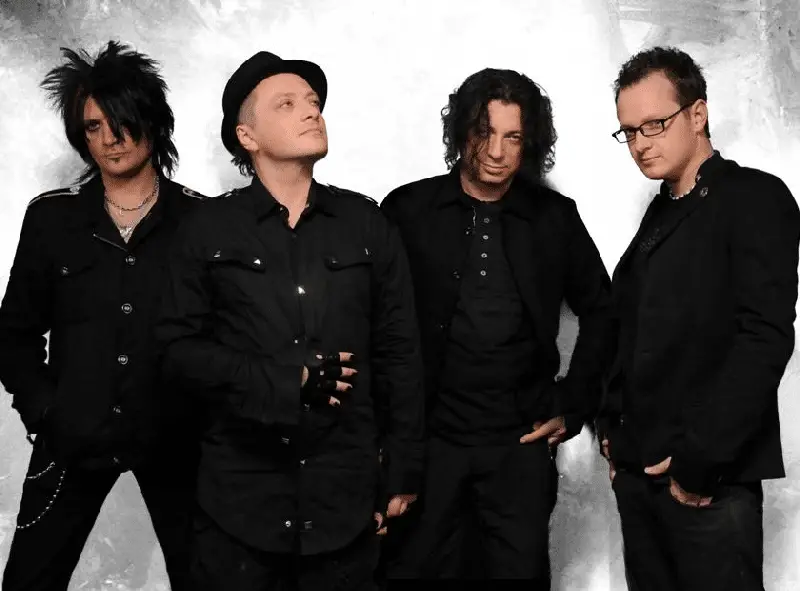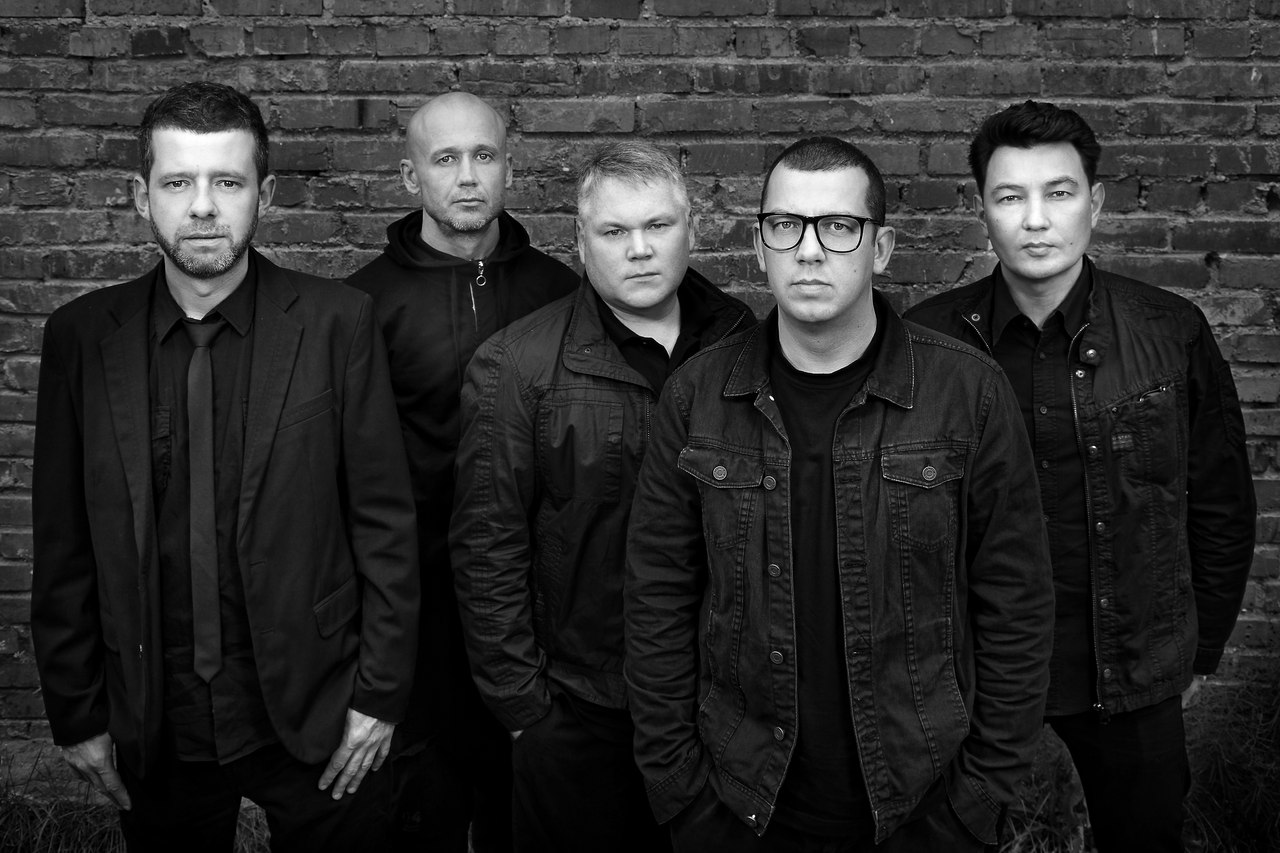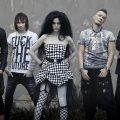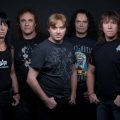Agata Kristi (Агата Кристи) was one of Russia’s most popular rock bands during the 1990s. Their sound tends toward gothic rock and post-punk, and at times even new wave. Agata Kristi’s impressive repertoire includes ten studio albums, five compilations, and eighteen music videos, as well as a long history of tours around Russia and abroad. The name is taken from the famous English crime novelist and mystery playwright Agatha Christie, in line with the band’s occasionally darker sound. On their website, they describe themselves as having started out as an “explosive mix of symphonic rock, art rock, and rock-and-roll, impregnanted with ideas of decadance.” Now later on in the band’s life, they are a less convention-smashing electronic-guitar group.
The group formed in 1987 in Sverdlovsk and played their first concert the following year at the Urals Polytechnic Institute. The original members were Vadim Samoilov (Вадим Самойлов, vocals, guitar, songwriter), Gleb Samoilov (Глев Самойлов, Vadim’s brother; vocals, bass guitar), Aleksandr Kozlov (Александр Козлов, keyboard), and Pyotr Mai (Пётр Май, percussion), who was only in the group for a short time before Andrey Kotov (Андрей Котов) replaced him. Agata Kristi’s first album, called Second Front (Второй Фронт) came out that same year as a magnitizdat—self-recorded—release. A remastered “official” version of the album would come out in 1997, at the height of the band’s popularity.
Agata Kristi’s second album, Guile and Love (Коварство и любовь) brought some acclaim, as a result of which the band was invited to play a number of large festivals. In 1989 Agata Kristi had the unique opportunity to represent “Russian rock” at an arts festival in Glasgow, Scotland.
In 1993, starting on a path that would lead the group to a measure of financial success, Agata Kristi released one of Russia’s first CDs, the album entitled Shameful Star (Позорная звезда). The album, which is still perhaps the group’s best-loved, spread fairly quickly around the country, and the band released music videos for two of its singles: “New Year” (“Новый год”) and “As in War”( “Как на войне”).
Agata Kristi’s next album, Opium (Опиум), which was largely inspired by the then-popular band Ace of Base, was likewise a huge success. The band reached peak popularity in 1996 with the release of Hurricane (Ураган). The premiere of the music video for “Two Boats” (“Два корабля”) was one of the most anticipated events in Russian show business of the 90s, and was simultaneously broadcast on radio and television.
The band stayed famous and continued their success throughout the ’90s, but crisis struck in 2001, when Aleksandr Kozlov,one of the band’s main song writers and founding members, died. The remaining members understandably went into something of a tailspin, refusing to replace Kozlov—the keyboard parts were played by sequencers at their concerts—and then pausing their musical activities as a group for some time. His death inspired a tribute album in his honor by several of Russia’s most popular rock bands.
In 2009, Agata Kristi embarked on what would be their farewell tour, hitting forty four cities and releasing a DVD entitled Epilogue (Эпилог) made up of live footage. They broke up in 2010, but have toured once in a while since then and reunited in 2015. They have released a total of 14 albums and are working on a 15th.
Here is Agata Kristi with “Opium for No One” (“Опиум для никого”):
Lyrics for “Опиум для никого”:
Я крашу губы гуталином,
Я обожаю чёрный цвет,
И мой герой, он соткан весь
Из тонких запахов конфет.
Напудрив ноздри кокаином,
Я выхожу на променад,
И звёзды светят мне красиво,
И симпатичен ад.
Давай вечером с тобой встретимся,
Будем опиум курить-рить-рить.
Давай вечером с тобой встретимся
По-китайски говорить.
Не прячь музыку, она опиум
Для никого, только для нас.
Давай вечером умрём весело,
Поиграем в декаданс.
Убей меня, убей себя,
Ты не изменишь ничего,
У этой сказки нет конца,
Ты не изменишь ничего.
Накрась ресницы губной помадой,
А губы лаком для волос,
Ты будешь мертвая принцесса,
А я твой верный пёс.
Давай вечером с тобой встретимся,
Будем опиум курить-рить-рить.
Давай вечером с тобой встретимся
По-китайски говорить.
Не прячь музыку, она опиум
Для никого, только для нас.
Давай вечером умрём весело,
Поиграем в декаданс.
Давай вечером с тобой встретимся,
Давай вечером с тобой встретимся.
Не прячь музыку, она опиум
Для никого, только для нас.
Давай вечером умрём весело…
Распечатать
Here is Agata Kristi live on their final tour playing “As in War” (“Как на войне”):
Lyrics for “Как на войне”:
Ляг, отдохни и послушай, что я скажу,
Я терпел, но сегодня я ухожу,
Я сказал – успокойся и рот закрой,
Вот и всё, до свидания, чёрт с тобой.
Я на тебе, как на войне, а на войне, как на тебе,
Но я устал, окончен бой, беру портвейн, иду домой.
Окончен бой, зачах огонь, и не осталось ничего,
А мы живём, а нам с тобою повезло назло.
Боль, это боль, как её ты ни назови,
Это страх, там где страх, места нет любви.
Я сказал – успокойся и рот закрой,
Вот и всё, до свидания, чёрт с тобой.
Я на тебе, как на войне, а на войне, как на тебе,
Но я устал, окончен бой, беру портвейн, иду домой.
Окончен бой, зачах огонь, и не осталось ничего,
А мы живём, а нам с тобою повезло назло.
Я на тебе, как на войне, а на войне, как на тебе,
Но я устал, окончен бой, беру портвейн, иду домой.
Окончен бой, зачах огонь, и не осталось ничего,
А мы живём, а нам с тобою повезло назло.











